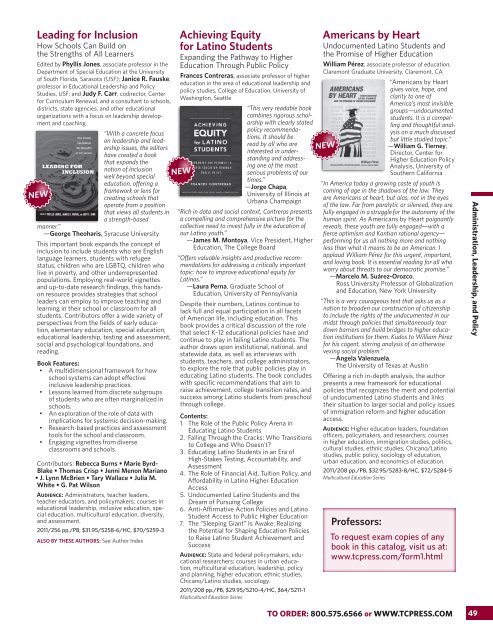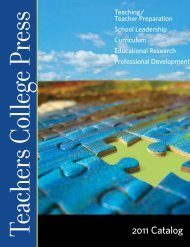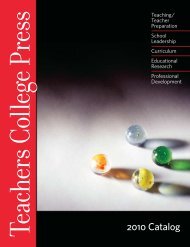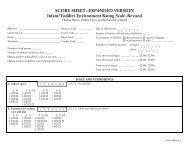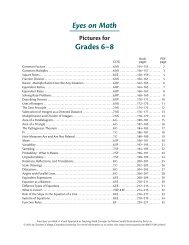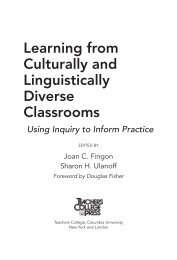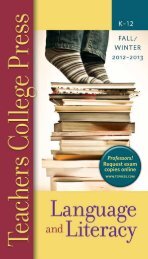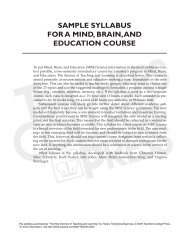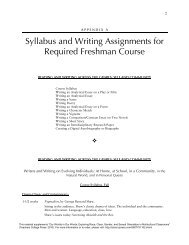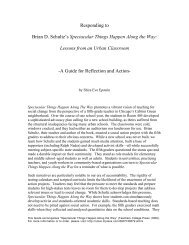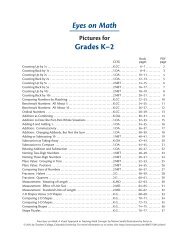estsellers - Teachers College Press
estsellers - Teachers College Press
estsellers - Teachers College Press
You also want an ePaper? Increase the reach of your titles
YUMPU automatically turns print PDFs into web optimized ePapers that Google loves.
Leading for Inclusion<br />
How Schools Can Build on<br />
the Strengths of All Learners<br />
Edited by Phyllis Jones, associate professor in the<br />
Department of Special Education at the University<br />
of South Florida, Sarasota (USF); Janice R. Fauske,<br />
professor in Educational Leadership and Policy<br />
Studies, USF; and Judy F. Carr, codirector, Center<br />
for Curriculum Renewal, and a consultant to schools,<br />
districts, state agencies, and other educational<br />
organizations with a focus on leadership development<br />
and coaching.<br />
New<br />
Edition<br />
NEW<br />
“With a concrete focus<br />
on leadership and leadership<br />
issues, the editors<br />
have created a book<br />
that expands the<br />
notion of inclusion<br />
well beyond special<br />
education, offering a<br />
framework or lens for<br />
creating schools that<br />
operate from a position<br />
that views all students in<br />
a strength-based<br />
manner.”<br />
—George Theoharis, Syracuse University<br />
Best<br />
Seller<br />
This important book expands the concept of<br />
inclusion to include students who are English<br />
language learners, students with refugee<br />
status, children who are LGBTQ, children who<br />
live in poverty, and other underrepresented<br />
populations. Employing real-world vignettes<br />
and up-to-date research findings, this handson<br />
resource provides strategies that school<br />
leaders can employ to improve teaching and<br />
learning in their school or classroom for all<br />
students. Contributors offer a wide variety of<br />
perspectives from the fields of early education,<br />
elementary education, special education,<br />
educational leadership, testing and assessment,<br />
social and psychological foundations, and<br />
reading.<br />
Book Features:<br />
• A multidimensional framework for how<br />
school systems can adopt effective<br />
inclusive leadership practices.<br />
• Lessons learned from discrete subgroups<br />
of students who are often marginalized in<br />
schools.<br />
• An exploration of the role of data with<br />
implications for systemic decision-making.<br />
• Research-based practices and assessment<br />
tools for the school and classroom.<br />
• Engaging vignettes from diverse<br />
classrooms and schools.<br />
Contributors: Rebecca Burns • Marie Byrd-<br />
Blake • Thomas Crisp • Jenni Menon Mariano<br />
• J. Lynn McBrien • Tary Wallace • Julia M.<br />
White • G. Pat Wilson<br />
Audience: Administrators, teacher leaders,<br />
teacher educators, and policymakers; courses in<br />
educational leadership, inclusive education, special<br />
education, multicultural education, diversity,<br />
and assessment.<br />
2011/256 pp./PB, $31.95/5258-6/HC, $70/5259-3<br />
Also by These Authors: See Author Index<br />
Achieving Equity<br />
for Latino Students<br />
Expanding the Pathway to Higher<br />
Education Through Public Policy<br />
Frances Contreras, associate professor of higher<br />
education in the area of educational leadership and<br />
policy studies, <strong>College</strong> of Education, University of<br />
Washington, Seattle<br />
New<br />
Edition<br />
NEW<br />
“This very readable book<br />
combines rigorous scholarship<br />
with clearly stated<br />
policy recommendations.<br />
It should be<br />
read by all who are<br />
interested in understanding<br />
and addressing<br />
one of the most<br />
serious problems of our<br />
times.”<br />
—Jorge Chapa,<br />
University of Illinois at<br />
Urbana Champaign<br />
“Rich in data and social context, Contreras presents<br />
a compelling and comprehensive picture for the<br />
collective need to invest fully in the education of<br />
our Latino youth.”<br />
—James M. Montoya, Vice President, Higher<br />
Education, The <strong>College</strong> Board<br />
“Offers valuable insights and productive recommendations<br />
for addressing a critically important<br />
topic: how to improve educational equity for<br />
Latinos.”<br />
—Laura Perna, Graduate School of<br />
Education, University of Pennsylvania<br />
Despite their numbers, Latinos continue to<br />
lack full and equal participation in all facets<br />
of American life, including education. This<br />
book provides a critical discussion of the role<br />
that select K–12 educational policies have and<br />
continue to play in failing Latino students. The<br />
author draws upon institutional, national, and<br />
statewide data, as well as interviews with<br />
students, teachers, and college administrators,<br />
to explore the role that public policies play in<br />
educating Latino students. The book concludes<br />
with specific recommendations that aim to<br />
raise achievement, college transition rates, and<br />
success among Latino students from preschool<br />
through college.<br />
Best<br />
Seller<br />
Contents:<br />
1. The Role of the Public Policy Arena in<br />
Educating Latino Students<br />
2. Falling Through the Cracks: Who Transitions<br />
to <strong>College</strong> and Who Doesn’t<br />
3. Educating Latino Students in an Era of<br />
High-Stakes Testing, Accountability, and<br />
Assessment<br />
4. The Role of Financial Aid, Tuition Policy, and<br />
Affordability in Latino Higher Education<br />
Access<br />
5. Undocumented Latino Students and the<br />
Dream of Pursuing <strong>College</strong><br />
6. Anti-Affirmative Action Policies and Latino<br />
Student Access to Public Higher Education<br />
7. The “Sleeping Giant” Is Awake: Realizing<br />
the Potential for Shaping Education Policies<br />
to Raise Latino Student Achievement and<br />
Success<br />
Audience: State and federal policymakers, educational<br />
researchers; courses in urban education,<br />
multicultural education, leadership, policy<br />
and planning, higher education, ethnic studies,<br />
Chicano/Latino studies, sociology.<br />
2011/208 pp./PB, $29.95/5210-4/HC, $64/5211-1<br />
Multicultural Education Series<br />
Americans by Heart<br />
Undocumented Latino Students and<br />
the Promise of Higher Education<br />
William Pérez, associate professor of education,<br />
Claremont Graduate University, Claremont, CA<br />
New<br />
Edition<br />
NEW<br />
“Americans by Heart<br />
gives voice, hope, and<br />
clarity to one of<br />
America’s most invisible<br />
groups—undocumented<br />
students. It is a compelling<br />
and thoughtful analysis<br />
on a much discussed<br />
but little studied topic.”<br />
—William G. Tierney,<br />
Director, Center for<br />
Higher Education Policy<br />
Analysis, University of<br />
Southern California<br />
“In America today a growing caste of youth is<br />
coming of age in the shadows of the law. They<br />
are Americans at heart, but alas, not in the eyes<br />
of the law. Far from paralytic or silenced, they are<br />
fully engaged in a struggle for the autonomy of the<br />
human spirit. As Americans by Heart poignantly<br />
reveals, these youth are fully engaged—with a<br />
fierce optimism and Kantian rational agency—<br />
performing for us all nothing more and nothing<br />
less than what it means to be an American. I<br />
applaud William Pérez for this urgent, important,<br />
and loving book. It is essential reading for all who<br />
worry about threats to our democratic promise.”<br />
—Marcelo M. Suárez-Orozco,<br />
Ross University Professor of Globalization<br />
and Education, New York University<br />
“This is a very courageous text that asks us as a<br />
nation to broaden our construction of citizenship<br />
to include the rights of the undocumented in our<br />
midst through policies that simultaneously tear<br />
down barriers and build bridges to higher education<br />
institutions for them. Kudos to William Pérez<br />
for his cogent, stirring analysis of an otherwise<br />
vexing social problem.”<br />
—Angela Valenzuela,<br />
The University of Texas at Austin<br />
Offering a rich in-depth analysis, the author<br />
presents a new framework for educational<br />
policies that recognizes the merit and potential<br />
of undocumented Latino students and links<br />
their situation to larger social and policy issues<br />
of immigration reform and higher education<br />
access.<br />
Audience: Higher education leaders, foundation<br />
officers, policymakers, and researchers; courses<br />
in higher education, immigration studies, politics,<br />
cultural studies, ethnic studies, Chicano/Latino<br />
studies, public policy, sociology of education,<br />
urban education, and economics of education.<br />
2011/208 pp./PB, $32.95/5283-8/HC, $72/5284-5<br />
Multicultural Education Series<br />
Best<br />
Seller<br />
Professors:<br />
To request exam copies of any<br />
book in this catalog, visit us at:<br />
www.tcpress.com/form1.html<br />
to order: 800.575.6566 or www.tcpress.com<br />
49<br />
Administration, Leadership, and Policy<br />
49


